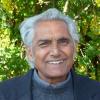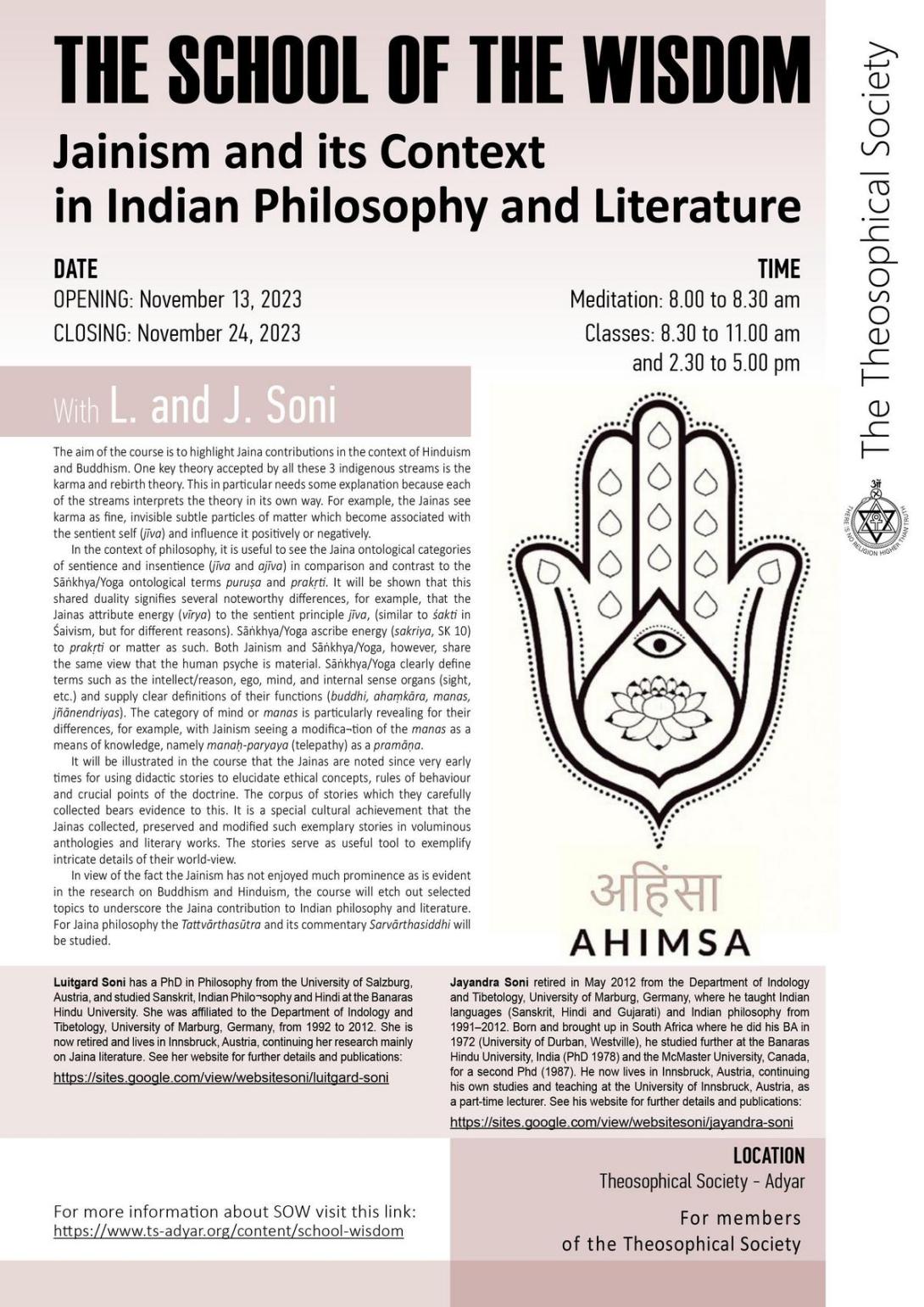Subject
Venue
Time (IST)
Event Speaker
Sign Up Link
Content
Theme: Jainism and its Context in Indian Philosophy and Literature
Facilitators: Dr Jayandra Soni & Dr Luitgard Soni
Dates: 13 - 24 November 2023
Daily: Meditation 8 - 8.30 AM, Classes 8.30 - 11.00 AM and 2.30 - 5.00 PM
Venue: TS at Adyar, India (not online)
APPLICATION: click here
Course Description (pdf attached)
The aim of the course is to highlight Jaina contributions in the context of Hinduism and Buddhism. One key theory accepted by all these 3 indigenous streams is the karma and rebirth theory. This in particular needs some explanation because each of the streams interprets the theory in its own way. For example, the Jainas see karma as fine, invisible subtle particles of matter which become associated with the sentient self (jīva) and influence it positively or negatively.
In the context of philosophy, it is useful to see the Jaina ontological categories of sentience and insentience (jīva and ajīva) in comparison and contrast to the Sāṅkhya/Yoga ontological terms puruṣa and prakṛti. It will be shown that this shared duality signifies several noteworthy differences, for example, that the Jainas attribute energy (vīrya) to the sentient principle jīva, (similar to śakti in Śaivism, but for different reasons). Sāṅkhya/Yoga ascribe energy (sakriya, SK 10) to prakṛti or matter as such. Both Jainism and Sāṅkhya/Yoga, however, share the same view that the human psyche is material. Sāṅkhya/Yoga clearly define terms such as the intellect/reason, ego, mind, and internal sense organs (sight, etc.) and supply clear definitions of their functions (buddhi, ahaṃkāra, manas, jñānendriyas). The category of mind or manas is particularly revealing for their differences, for example, with Jainism seeing a modification of the manas as a means of knowledge, namely manaḥ-paryaya (telepathy) as a pramāṇa.
It will be illustrated in the course that the Jainas are noted since very early times for using didactic stories to elucidate ethical concepts, rules of behaviour and crucial points of the doctrine. The corpus of stories which they carefully collected bears evidence to this. It is a special cultural achievement that the Jainas collected, preserved and modified such exemplary stories in voluminous anthologies and literary works. The stories serve as useful tool to exemplify intricate details of their world-view.
In view of the fact the Jainism has not enjoyed much prominence as is evident in the research on Buddhism and Hinduism, the course will etch out selected topics to underscore the Jaina contribution to Indian philosophy and literature. For Jaina philosophy the Tattvārthasūtra and its commentary Sarvārthasiddhi will be studied.
The course will be done on the basis of 10 themes which make up the syllabus:
1. Introduction to Indian philosophy, including the karma and rebirth theory.
2. The Sāṅkhya and Yoga systems of Indian Philosophy (JS).
3. Sāṅkhya and Yoga systems of Indian Philosophy Continued (JS).
4. Introduction to Jainism (JS).
5. Jaina Narrative Literature (LS).
6. The Jaina theory of knowledge (JS).
7. Jaina ethics and its emphasis on non-violence (ahiṃsā), including Ecology and Human-Animal Relations (LS).
8. Worldliness (bhoga) and Renunciation/Asceticism (vairāgya) in Jaina Narratives (LS).
9. Death and Dying in Jainism (LS)
10. Recapitulation of and Discussion on the above themes (JS and LS).
FACILITATORS

Dr Luitgard Soni has a PhD in Philosophy from the University of Salzburg, Austria, and studied Sanskrit, Indian Philosophy and Hindi at the Banaras Hindu University. She was affiliated to the Department of Indology and Tibetology, University of Marburg, Germany, from 1992 to 2012. She is now retired and lives in Innsbruck, Austria, continuing her research mainly on Jaina literature. See her website for further details and publications:
https://sites.google.com/view/websitesoni/luitgard-soni

Dr Jayandra Soni retired in May 2012 from the Department of Indology and Tibetology, University of Marburg, Germany, where he taught Indian languages (Sanskrit, Hindi and Gujarati) and Indian philosophy from 1991–2012. Born and brought up in South Africa where he did his BA in 1972 (University of Durban, Westville), he studied further at the Banaras Hindu University, India (PhD 1978) and the McMaster University, Canada, for a second Phd (1987). He now lives in Innsbruck, Austria, continuing his own studies and teaching at the University of Innsbruck, Austria, as a part-time lecturer. See his website for further details and publications:
What is provided
Meals are optionally provided. Sign up for it separately


